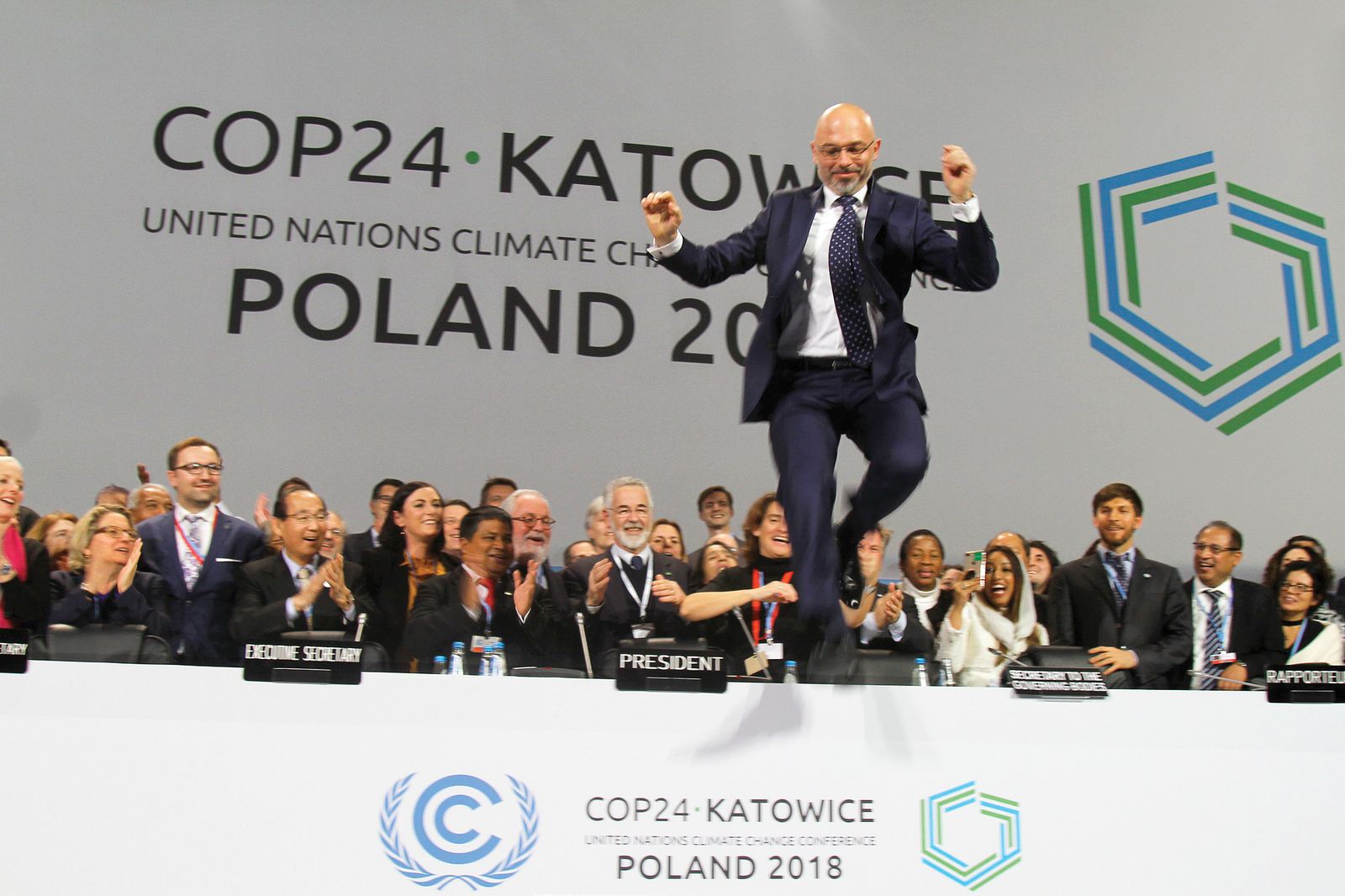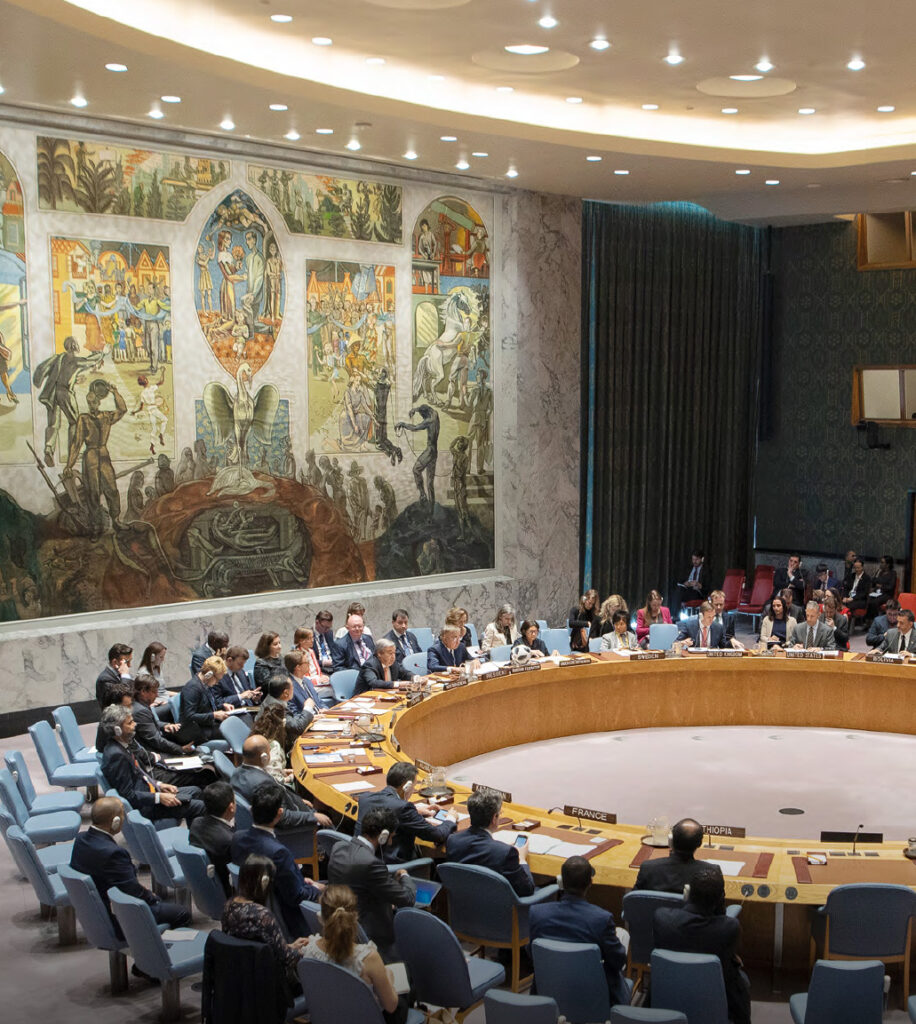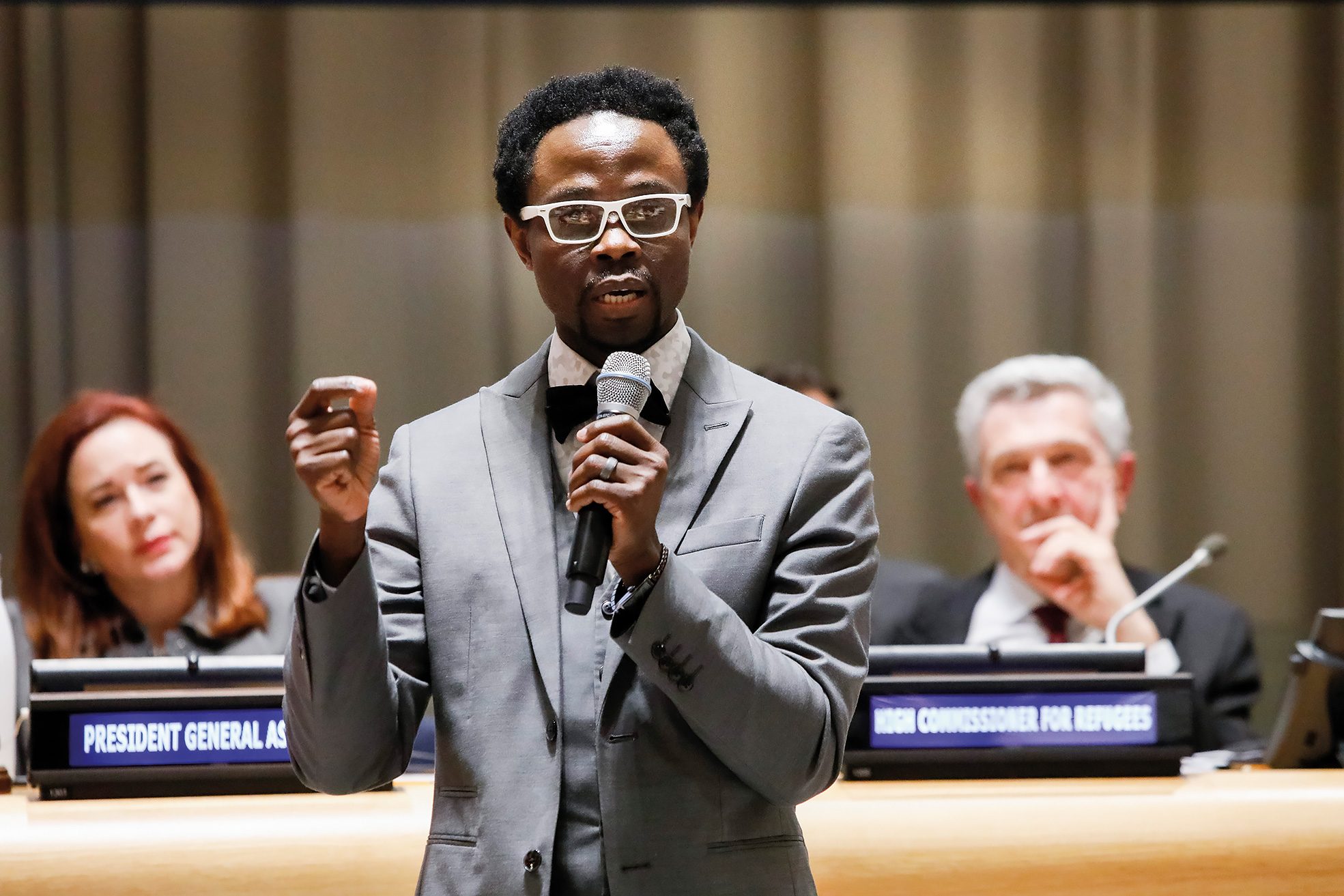As we approach the seventy-fifth anniversary of the United Nations, the world’s leading instrument of shared progress, our common purposes and principles remain as important as ever. The Organization, and its ethos of international cooperation, have yielded great and wide-ranging benefits to humankind, lifting millions out of poverty, upholding human rights and helping to forge peace in troubled lands. In today’s rapidly changing world, our enduring and Charter-driven duty is to build on those achievements and ensure that all people can enjoy safety, prosperity and dignity. In that spirit, I offer my third report on the work of the Organization concerned about the state of our world – but also encouraged by what I know we can deliver for the people we serve.

COP24 President Michael Kurtyka, State Secretary, Ministry of Energy, Poland, jumps after approval of the Paris Agreement Work Programme at 2018 Katowice conference.
Challenges that transcend borders
The world continues to face grave global challenges that no single Member State or organization can address alone. The existential threat posed by climate change is paramount among those perils. Climate change-related disasters affect an average of 350 million people every year, and every day global warming is reversing hard-won development gains and exacerbating poverty. Biodiversity is being lost at an alarming rate.
In 2019, nearly 142 million people will need humanitarian assistance. Armed conflicts and violence continue to destroy lives and communities. Conflicts have become more complex and interlinked. Violent extremism and terrorism continue to destabilize countries and entire regions.
Pervasive poverty and rising inequality across and especially within countries are of significant concern, as are the worrying trends of shrinking democratic and civic space, often affecting human rights defenders, health workers and journalists first. Violence against women and girls and renewed pushback against women’s rights and gender equality remain pervasive across the world.
Those factors, among others, have contributed to increasing levels of displacement, which expose vulnerable populations on the move to human rights violations and create complex challenges in transit and destination countries. As these and other problems persist and proliferate, we see growing fear, uncertainty and frustration undermining public trust in institutions and political establishments and providing a breeding ground for hate speech, xenophobia and other divisive and dangerous narratives.
My profound concern about this alarming trajectory – including hate-driven violence and atrocious attacks on places of worship – led me to launch a strategy to combat hate speech and to explore how the United Nations can support the protection of holy sites around the world.
”Global challenges require global solutions. It is not enough to proclaim the virtue of multilateralism; we must prove its added value.”
”International cooperation is key to lifting the decade of action to deliver the SDGs by 2030. We need transformations that leave no one behind.”
Multilateralism matters
In 2018, the United Nations system demonstrated what we can accomplish when we work together, and what we need to do to generate further progress.
The 2030 Agenda for Sustainable Development, encapsulated in the 17 Sustainable Development Goals, continues to provide a clear and universal road map for building a fair globalization and transforming economies and societies to ensure that no one is left behind. Much progress has been achieved. Yet, at the current pace, we will not reach our targets. We need to bring much greater urgency and ambition to this work, through enhanced international cooperation, private-public partnerships, adequate financing and innovative solutions. We also need to empower young people as partners and leaders, as envisaged in Youth 2030: The United Nations Strategy on Youth.

Secretary-General António Guterres and Deputy Secretary-General Amina J. Mohammed during a meeting in New York.
Despite hurdles, the climate change conference held in Katowice, Poland, in December agreed on a work programme to implement the 2015 Paris Agreement on climate change, a notable step forward. The climate summit to be held in September 2019 will be an opportunity to accelerate the global response towards the goal of limiting the temperature rise to 1.5°C and to meet other climate targets for 2020 and beyond.
In December 2018, the agreement by Member States on a landmark Global Compact for Safe, Orderly and Regular Migration provided a voluntary platform for countries of origin, transit and destination to maximize the benefits of migration and tackle its associated challenges. Along with the global compact on refugees, affirmed that same month, the world now has far-reaching pathways to ensure that human mobility works for all.
Our peace operations continue to be vital. Through the Action for Peacekeeping initiative, we have strengthened our partnership with troop- and police-contributing countries, Security Council members and host countries. Since the launch of this effort in March 2018, more than 150 Member States and 4 international and regional organizations have endorsed the Declaration of Shared Commitments on United Nations Peacekeeping Operations.
We have conducted independent reviews of our operations to assess how we can better deliver on our mandates, and have prioritized efforts to increase the number of female uniformed personnel. We are also promoting women’s meaningful inclusion in peace processes, given that experience shows that this produces more robust and sustainable agreements.

Secretary-General António Guterres addresses the Security Council meeting on the maintenance of international peace and security, focusing on a comprehensive review of the situation in the Middle East and North Africa.
I have proposed a new disarmament agenda to address weapons of mass destruction and conventional weapons and to ensure that wondrous new technologies do not spark a horrendous new arms race. Our aim is threefold: disarmament to save humanity, disarmament to save lives and disarmament to safeguard our future.
While the United Nations continues to provide life-saving humanitarian assistance and strengthen peace operations, we are all keenly aware that ending wars and violence is the only real and long-term solution to the destruction and human suffering they cause. This is why, since taking office, I have placed an emphasis on prevention, mediation and a surge in peacemaking and diplomacy.
Recent months have seen progress in addressing volatile situations, resolving conflicts and restoring hope to those affected by years of war, violence and instability, for example by ensuring peaceful and democratic elections in Madagascar. In February 2019, Greece and North Macedonia settled their long-standing “name” dispute, showing that even seemingly intractable issues can be resolved through dialogue and political will. Close cooperation with regional organizations has been essential.
However, in the face of complex conflicts, this work is difficult and requires patience and persistence, as we have seen in the Central African Republic, South Sudan and the Syrian Arab Republic. In Yemen, the United Nations-brokered Stockholm Agreement, reached in December 2018, represented welcome progress, although there are still many obstacles, and more needs to be done to ensure that the parties live up to their commitments and that a true political process finally leads to peace. Across these and other situations, I continue to offer my good offices and personal engagement wherever they can add value, alongside my envoys and special representatives, drawing on the experience of the United Nations and those in the broader mediation community.
At the same time, we are committed to a collective system-wide approach to addressing such challenges as the outbreak of the Ebola virus in the Democratic Republic of the Congo, which continues to unfold in a challenging environment marked by conflict and insecurity. I urge Member States and partner organizations to ensure that the responding agencies have the resources they need to succeed.

Miroslav Lajčák (centre), President of the 72nd session of the General Assembly, and Co-facilitators for the United Nations Global Compact on Migration process, Juan José Gómez Camacho (second from right), Permanent Representative of Mexico to the United Nations, and Jürg Lauber (right), Permanent Representative of Switzerland to the United Nations, hold up the gavel at the end of the meeting finalizing the draft document.
“The purpose and principles of the United Nations are more relevant than ever. They remain our shared compass to a more peaceful and sustainable world. We will get there by working together.”
Uniting for reform
To meet current and emerging global challenges, we have embarked on major reforms of the Organization. We have transformed the United Nations development system and rolled out a new generation of country teams and resident coordinators. We have strengthened and streamlined our peace and security architecture to better integrate prevention, peacemaking, peacekeeping and peacebuilding. We have created new management structures at Headquarters to provide better policy advice and operational support to the rest of the Secretariat, in particular in the field. We have decentralized decision-making authority to ensure that managers have the means at their disposal to deliver their programmes, while at the same time being held accountable for the use of their resources and the performance of their entities. We have adopted new management practices and developed new capacities.
Reform is ultimately about ensuring that we are best positioned to serve people – people suffering in poverty or exclusion, victimized by conflict, those whose rights and dignity are being denied, and so many millions with ideas and dreams who need a helping hand.
To fulfil our mandates more efficiently and effectively, our actions must be rooted in transparency, coordination and accountability. We must break silos and bring the pillars of our work together so that efforts to advance peace, sustainable development and human rights are mutually reinforcing.

Students with climate action signs in Albert park, Suva, Fiji
We also continue to make significant progress towards gender parity: for the first time in the Organization’s history, we have achieved parity in the Senior Management Group and among resident coordinators, and are almost at parity among the senior leadership ranks across the Organization, well ahead of my target date of 2021. This is not just an exercise in numbers; it is about creating an inclusive workforce. With respect to sexual harassment, exploitation and abuse, our focus remains on prevention, responding rapidly to allegations, supporting victims through their trauma and ensuring accountability. Towards that end, we have established a helpline for staff, strengthened our investigative capacity and established a screening database to prevent perpetrators from moving undetected from one part of the United Nations system to another. Those three challenges together – achieving gender parity, preventing sexual harassment and preventing sexual exploitation and abuse – are critical to my overall reform initiatives and for taking the Organization forward.

Addressing a financial crisis
Success in reform also rests on sufficient and predictable financial contributions from Member States. Yet regular budget operations financed from assessed contributions face severe cash shortfalls and deficits that are happening earlier, going deeper and lasting longer. In addition, structural weaknesses in the budget methodology can cause expenditures to outpace the approved budget level and the collection of assessed contributions. The peacekeeping budget faces similar problems. More than one third of our peacekeeping missions do not have cash resources to cover their costs, which creates delays in making payments to troop- and police-contributing countries. I have done everything within my power to persuade Governments to pay assessed contributions on time, and I thank those – the vast majority – that have done so. But we are still nowhere near where we need to be. We are at a tipping point, and what we do next will matter for years to come. That is why I put forward a set of concrete, common-sense proposals to squarely address the deteriorating and unsustainable financial situation. The proposals were aimed at preventing any disruption to our activities and ensuring that our work is guided by prioritized mandates.
I appreciate the General Assembly’s positive response in July to some of the proposals. Those actions will not entirely solve the problem, but will at least enable us to reimburse troop- and police-contributing countries in a more timely manner. Unfortunately, we have not yet resolved the crisis facing our regular budget operations, which, if left unaddressed, will undermine our ability to implement mandates and the approved programme of work. I urge Governments to find common ground to address this crisis and put the Organization on a solid financial footing.
Harnessing new technologies
Transformational technologies and scientific advances will continue to bring change at a rapid pace, outstripping the capacity of Governments and multilateral institutions to respond appropriately. Strong international cooperation, as well as inclusive processes open to all relevant stakeholders, are critical if we want to grasp the opportunities created by new technologies to reduce poverty, reverse climate change, fight hate speech, expand opportunities for young people and address other pressing global challenges. The debate initiated by the report of the independent High-level Panel on Digital Cooperation will continue in the coming months. The United Nations stands ready to serve as a platform for a discussion of how these new technologies can serve as a force for good and help to achieve the Sustainable Development Goals.

Looking forward
I have visited the Central African Republic and mourned fallen peacekeepers in Bangassou who gave everything for the cause of peace; met with courageous human rights defenders in Colombia and elsewhere; been inspired by the passion of young students for education in schools run by the United Nations Relief and Works Agency for Palestine Refugees in the Near East; journeyed to central Mali and heard the profound determination of local leaders to fight for peace and reconciliation; and travelled to the front lines of the world’s climate emergency and seen the devastation resulting from extreme weather disasters, such as those in Mozambique and the Caribbean – places that have done little to contribute to the climate crisis yet are often its first victims.

Across these diverse circumstances and many more, I have seen a common thread: a deep conviction by people all over the world that the United Nations must live up to its ideals. I take that duty to heart and am strongly committed to pushing Member States to do their part while I do mine – to build an effective and responsive agent of progress for all.
There is no other way to address global challenges but to act collectively. But in today’s difficult context, it is not enough to proclaim the virtue of multilateralism; we must prove its added value. On the eve of the Organization’s seventy-fifth anniversary, the Charter of the United Nations points the way, with its hope for a future in which people and countries live together as good neighbours, defending universal values and shaping our common future. Commitment to this vision is needed now more than ever.
